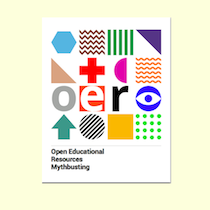Open Content
This guide brings together information about Open Access Resources and Open Educational Resources. It aims to make Open Access resources easier to find and use for study, teaching and research.
Open Access Resources and Open Educational Resources
What do we mean by OA and OER?
Open Access (OA) refers to research publications, such as scholarly articles and journals, that have been made freely available so anyone can benefit from reading them and using their research.
OA makes research available to many more people than a subscription-only journal article does & there is evidence that this can lead to an increase in citations. OA also encourages public engagement with research, which is often paid for out of public money. It is also part of a wider ‘open’ movement to encourage free exchange of knowledge and resources in order to widen access and encourage creativity.
These resources can be reused and there is some scope for alteration.
Open Educational Resources (OER) are freely available online materials that have been released by the copyright holder on an open licence permitting their use and re-purposing by others. Examples include, technical diagrams, lesson plans, lectures, teaching materials, and various other resources. OERs are available in many different formats compatible with online usage most obviously text, images, audio and video. OER encourages remixing and redistribution of the resource and covers a wider range of materials than OA.
Anyone with internet access can access and use OERs; access is not dependent on location or membership of a particular institution. OERs are particularly useful for researchers, teachers and learners. Educational institutions and providers enhance their websites by creating and maintaining access to OERs and service providers such as iTunes and SlideShare also have many OERs to offer.
OERs use Creative Commons (CC) licenses to ensure that materials can be used in a wide variety of ways e.g. edited, remixed, enhanced and copied.
Here at The University of Edinburgh, we believe that open educational resources play an important role in supporting our vision, purpose and values; to discover knowledge and make the world a better place, and to ensure our teaching and research is diverse, inclusive, accessible to all and relevant to society. To learn more about OERs at The University of Edinburgh you can visit https://open.ed.ac.uk the webpage for our Open Education Resources service.

Image: OER is sharing, by Giulia Forsythe, licensed CC0
The difference between OA and OER

Source: University of Michigan OER Toolkit
Where do I start?
Now that you're familiar with definitions of Open Access and OERs, you might find the following resources a helpful next step:
- Finding Open Content - There are many sources of free-to-use content available online. This page provides suggestions on where to look for such content.
- Finding OERs using search services - There are a number of search services that allow you quickly and easily find a wide range of open educational resources and open licensed content online. This page will help you get started with some popular websites.
- DiscoverEd - DiscoverEd is the Library's discovery service. You can use it to search the Library's collections (books, e-books, journal titles, journal articles, databases and more) but you can also search for open resources by selecting Show Only - Open Access in the filters. For more information try the Searching DiscoverEd page, or this video on conducting a simple search (6 minutes).
- Open Research - Find out more about the Open Research activities at the University of Edinburgh.
If you're looking for a particular type of content, use the navigation on the left of the screen to browse our pages dedicated to locating different types of open resources.
Making the most of Open Access Resources : quick guide
-
Making the most of Open Access resourcesUse this quick guide for an overview of Open Access resources and services supported by Information Services Group at the University of Edinburgh.

Source: art designer at PLoS, CC0 via Wikimedia Commons
Source: Jonathasmello, CC BY 3.0 via Wikimedia Commons
OER mythbusting
Criticism of Open Educational Resources is diverse, motivated by varied anxieties and uncertainties, but also particular interests. Some of this criticism is justified and points to areas which need further work on the part of the OER community, or refer to specific OER projects. Visit OER Mythbusting to find out more.

OA/OER publishing
This guide is designed to help researchers, students and staff at the University of Edinburgh to find Open Resources.
If you would like more information on how to publish your work as Open Access or an Open Educational Resource, you will find more information on the Research Support page.


